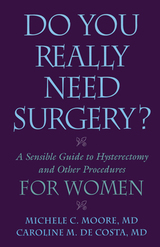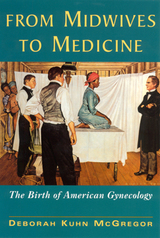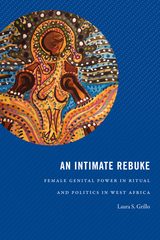
At last, here is a user-friendly guide to gynecologic surgery. The authors' guiding principle is that each woman for whom any kind of surgery is recommended should be well informed about the indications, the risks, and the expected results.
Using anecdotes drawn from a combined fifty years of experience, doctors Moore and de Costa provide clear and accurate information about women's anatomy, physiology, common gynecological ailments, diagnosis, alternative treatments, and, finally, full details about surgery itself. Among the surgeries discussed are removal of the uterus (hysterectomy), removal of the ovaries (oophorectomy), and removal of fibroids. The various ways of performing these procedures are examined, including minimally invasive surgery done through the laparoscope.
The authors also help the patient through the post-operative phase, revealing what to expect, how to make the recovery easier, and how to take care of yourself after the surgery. The result is a book that empowers women as they weigh their options with regard to gynecologic surgery.

Using patient records and archival material from the female governors and administrators at the hospital, From Midwives to Medicine shows how a new medical practice developed out of the changing patterns and historical experiences of childbirth, as well as out of the context of the social relations f the sexes. Sim's patients were slave women in the antebellum South, poor Irish immigrants in the industrial North, and upper-class white. Protestant, Manhattan socialites who sought help for their "hysterical" symptoms. During his career, which began in the South and flourished at the Women's Hospital in New York. Sims performed and perfected his technique to "cure" vesico-vaginal fistulas, the tears of childbirth, from which so many women suffered. But Sims achieved these successes on the operating table only after years of practicing his "silver suture" technique on unanesthetized slave women, who he believed "by the nature of their race... had a specific physiological tolerance for pain unknown to whites."


Drenth describes the workings of the vagina in simple language, enriching his description throughout the book with the imagery, mythology, lore, and history that has surrounded the vagina since the Middle Ages. The Origin of the World moves from basic physiognomic facts to the realms of anthropology, art history, science fiction, and feminist literature-all in the service of mapping the dark continent. Drenth's journey takes him from Renaissance woodcuts to vibrators, clitoridectomies to "virginity checks," fears of the vagina (the vagina dentata) to its celebration. Part medical exposition covering the function of female genitalia from orgasm to pregnancy and part cultural history discussing contemporary and historical views of such aspects of the feminine as pubic hair, Freud's theories of coitus, and slang terms for the vagina, The Origin of the World is encyclopedic in its breadth, fascinating in its content, and familiar in its subject.
This lightly written exploration can be seen as both an owner's manual and a guide for the perplexed. Women and men alike will benefit from its entertaining erudition and from its fundamental mission of demystifying sex and sexuality in the service of greater understanding and, from that understanding, greater pleasure.
READERS
Browse our collection.
PUBLISHERS
See BiblioVault's publisher services.
STUDENT SERVICES
Files for college accessibility offices.
UChicago Accessibility Resources
home | accessibility | search | about | contact us
BiblioVault ® 2001 - 2024
The University of Chicago Press









